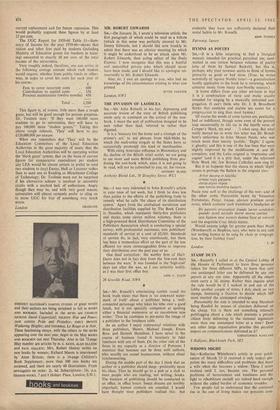HYMNS AS POETRY
SIR,—It is a little surprising to find a liturgical manual, intended for practical parochial use, sand- wiched in one review between volumes of poetry (one of them by Samuel Beckett); but this is, perhaps, why your reviewer seems to think of hymns primarily as good or bad verse. (True, he writes scornfully of 'square Nordic tunes'—a generalisation hardly applicable to the book he is reviewing, which
contains music from many non-Nordic sources.)
A hymn differs from any other art-form in that it is a combination of verse and music usually intended for singing by a musically untrained con- gregation. (I can't think why Dr. J. B. Broadbent thinks that canticles and psalms are easier for a congregation to sing than most hymns.) Of course the words of some hymns are, poetically, bad or indifferent, though some even of the poorest leap occasionally to life (as in the fourth verse of Cowper's 'Hark, my soul . .') when sung. But what really moved me to write this letter was Dr. Broad- bent's unfairness to John Mason Neale, who was much more than merely 'prolific.' Dight,' I agree, is ghastly; and this is one of the few lines that were slightly improved by the meddlesome A. and M. compilers; and the Latin original is 'impressive and cogent' (and it is a pity that, under the reformed Holy Week rite, few Roman Catholics now sing it).
But it so happens that the stanza in which 'dight' occurs is perhaps the flattest in the original also; Arbor decora et fulgida, ornata regis purpura, electa digit° stipite tam sancta 'umbra tangere.
Neale rose well to the challenge of the rest—and of the other noble Passiontide hymn by Venantius Fortunatus, Pange, lingua, gloriosi prcelium
cerla-
mints, which contains such translator's headaches as t
De parentis promplasti fraude factor condolens
quando point noxialis ',torte MOPSU corruit ipse.lignum tune notavit datnna igni at solverel and the exquisite Crux fidelis stanza.
Would anyone jude far greater poets than Neale (Wordsworth or Hopkins, say), who were in any case not writing hymns to be sung by choir or congrega- tion, by their feeblest lines?
London


































 Previous page
Previous page